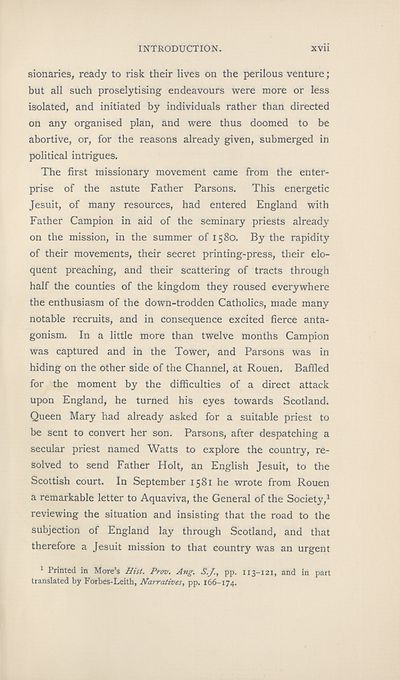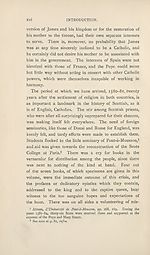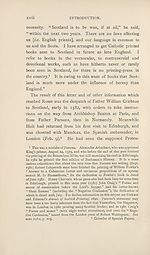Scottish Text Society publications > Old series > Catholic tractates of the sixteenth century, 1573-1600
(21)
Download files
Complete book:
Individual page:
Thumbnail gallery: Grid view | List view

INTRODUCTION.
XVII
sionaries, ready to risk their lives on the perilous venture;
but all such proselytising endeavours were more or less
isolated, and initiated by individuals rather than directed
on any organised plan, and were thus doomed to be
abortive, or, for the reasons already given, submerged in
political intrigues.
The first missionary movement came from the enter¬
prise of the astute Father Parsons. This energetic
Jesuit, of many resources, had entered England with
Father Campion in aid of the seminary priests already
on the mission, in the summer of 1580. By the rapidity
of their movements, their secret printing-press, their elo¬
quent preaching, and their scattering of tracts through
half the counties of the kingdom they roused everywhere
the enthusiasm of the down-trodden Catholics, made many
notable recruits, and in consequence excited fierce anta¬
gonism. In a little more than twelve months Campion
was captured and in the Tower, and Parsons was in
hiding on the other side of the Channel, at Rouen. Baffled
for the moment by the difficulties of a direct attack
upon England, he turned his eyes towards Scotland.
Queen Mary had already asked for a suitable priest to
be sent to convert her son. Parsons, after despatching a
secular priest named Watts to explore the country, re¬
solved to send Father Holt, an English Jesuit, to the
Scottish court. In September 1581 he wrote from Rouen
a remarkable letter to Aquaviva, the General of the Society,1
reviewing the situation and insisting that the road to the
subjection of England lay through Scotland, and that
therefore a Jesuit mission to that country was an urgent
1 Printed in More’s Hist. Prov. Ang. S.J, pp. 113-121, and in part
translated by Forbes-Leith, Narratives, pp. 166-174.
XVII
sionaries, ready to risk their lives on the perilous venture;
but all such proselytising endeavours were more or less
isolated, and initiated by individuals rather than directed
on any organised plan, and were thus doomed to be
abortive, or, for the reasons already given, submerged in
political intrigues.
The first missionary movement came from the enter¬
prise of the astute Father Parsons. This energetic
Jesuit, of many resources, had entered England with
Father Campion in aid of the seminary priests already
on the mission, in the summer of 1580. By the rapidity
of their movements, their secret printing-press, their elo¬
quent preaching, and their scattering of tracts through
half the counties of the kingdom they roused everywhere
the enthusiasm of the down-trodden Catholics, made many
notable recruits, and in consequence excited fierce anta¬
gonism. In a little more than twelve months Campion
was captured and in the Tower, and Parsons was in
hiding on the other side of the Channel, at Rouen. Baffled
for the moment by the difficulties of a direct attack
upon England, he turned his eyes towards Scotland.
Queen Mary had already asked for a suitable priest to
be sent to convert her son. Parsons, after despatching a
secular priest named Watts to explore the country, re¬
solved to send Father Holt, an English Jesuit, to the
Scottish court. In September 1581 he wrote from Rouen
a remarkable letter to Aquaviva, the General of the Society,1
reviewing the situation and insisting that the road to the
subjection of England lay through Scotland, and that
therefore a Jesuit mission to that country was an urgent
1 Printed in More’s Hist. Prov. Ang. S.J, pp. 113-121, and in part
translated by Forbes-Leith, Narratives, pp. 166-174.
Set display mode to: Large image | Zoom image | Transcription
Images and transcriptions on this page, including medium image downloads, may be used under the Creative Commons Attribution 4.0 International Licence unless otherwise stated. ![]()
| Publications by Scottish clubs > Scottish Text Society publications > Old series > Catholic tractates of the sixteenth century, 1573-1600 > (21) |
|---|
| Permanent URL | https://digital.nls.uk/107663548 |
|---|
| Description | A collection of over 100 Scottish texts dating from around 1400 to 1700. Most titles are in Scots, and include editions of poetry, drama, and prose by major Scottish writers such as John Barbour, William Dunbar, Gavin Douglas, and George Buchanan. Edited by a key scholarly publisher of Scotland's literary history, and published from the late 19th century onwards by the Scottish Text Society. Available here are STS series 1-3. |
|---|

